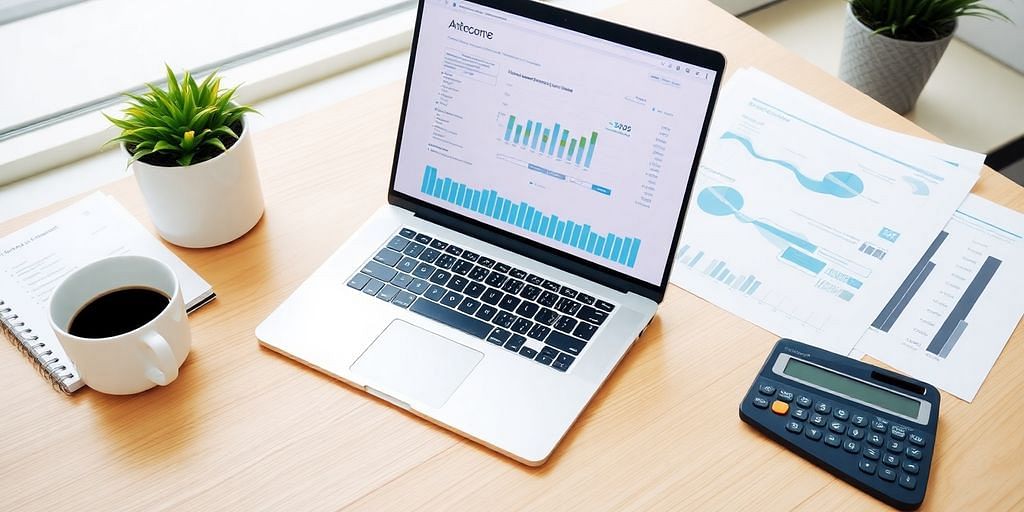
Unlocking Success: The Best Financial Software for Small Business in 2025
Back To BlogWhy Accounting Software Is Essential for Small Businesses
We all know running a small business is tough. There are a million things to juggle, and keeping track of your finances can feel like a never-ending battle. That's where accounting software comes in. It's not just a nice-to-have; it's a must-have for any small business that wants to succeed. Let's look at why.
Time-Saving Automation
Time is money, right? Accounting software automates so many of the tedious tasks that used to eat up our time. Think about invoicing, reconciling bank statements, and generating reports. All that manual data entry? Gone! With automation, we can focus on growing our business and doing what we love. It's like having an extra employee, but without the salary!
Boosting Accuracy and Compliance
Nobody wants to deal with errors in their financial records, especially when it comes to taxes. Accounting software helps us keep things accurate and compliant. It automates calculations, reduces the risk of mistakes, and can even help us prepare for tax season. No more scrambling at the last minute or worrying about penalties. Plus, many platforms offer features that help us stay on top of changing regulations. Using accounting software can really give you peace of mind.
Enhancing Decision-Making with Real-Time Insights
Imagine having a clear picture of your business's financial health at any moment. That's what accounting software provides. With real-time data and detailed reports, we can see exactly where our money is going and make informed decisions about the future. Whether we're planning a new marketing campaign or just trying to manage cash flow, these insights are invaluable. It's like having a financial advisor at our fingertips. For example, you can use QuickBooks Online to track your business's performance.
Top Features to Look for in Financial Software
Choosing the right financial software can feel like a big deal, but it doesn't have to be overwhelming. We're going to break down the key features that really matter, so you can make a smart choice for your business. It's about finding something that fits your needs, not just the latest trend.
User-Friendly Interface
Let's be real, nobody wants to spend hours trying to figure out how to use a new piece of software. A user-friendly interface is a must-have. We need something with clear navigation and a layout that makes sense. Think about it: the easier it is to use, the more likely we are to actually use it! Look for software ease of use that offers guided setup and plenty of tutorials.
Integration Capabilities
Your accounting software shouldn't live on an island. It needs to play well with the other tools we're already using. We're talking about things like:
- Payment processors (like PayPal or Stripe)
- E-commerce platforms (Shopify, WooCommerce, etc.)
- CRM systems (Salesforce, HubSpot)
- Payroll software (Gusto, ADP)
The ability to connect with these other systems saves time, reduces errors, and gives us a much clearer picture of our overall business performance. It's all about making things work together smoothly.
Scalability for Growing Businesses
What works for us today might not work in a year or two. That's why scalability is so important. We need software that can grow with us as our business expands. This means it should be able to handle increased transaction volumes, more complex reporting needs, and maybe even multi-currency support if we're planning to go global. Think of production scheduling as an investment in our future, not just a tool for right now.
The Best Financial Software for Small Business in 2025

Okay, so we've looked at why accounting software is a must-have and what features to keep an eye on. Now, let's get down to brass tacks: which software should we actually be considering in 2025? There are a bunch of options out there, but some consistently rise to the top. We're going to highlight a few that stand out for different reasons.
QuickBooks: The All-Rounder
QuickBooks is kind of like the Swiss Army knife of accounting software. It's been around for ages and has a ton of features, making it a solid choice for most small businesses. It handles everything from basic bookkeeping to payroll and inventory management. The downside? It can be a bit pricey, and the sheer number of features can feel overwhelming at first. But if you want something that can grow with your business, QuickBooks is definitely worth a look. You can easily manage your business finances with this software.
Xero: Perfect for Collaboration
If you work closely with an accountant or have a team that needs access to your financial data, Xero is a great option. It's designed with collaboration in mind, making it easy to share information and work together in real-time. The interface is clean and intuitive, and it integrates well with other business tools. Some users find it lacks some of the advanced features of QuickBooks, but its collaborative capabilities are hard to beat.
FreshBooks: Ideal for Service-Based Businesses
FreshBooks is tailored specifically for service-based businesses like freelancers, consultants, and agencies. It excels at invoicing, time tracking, and project management. The interface is super user-friendly, and it makes it easy to track expenses and send professional-looking invoices. If you don't need all the bells and whistles of a full-fledged accounting system, FreshBooks is a fantastic choice. It's a great way to explore the best accounting software for your business.
Choosing the right financial software is a big decision. It's not just about the features; it's about finding a tool that fits your business's unique needs and helps you achieve your goals. Take your time, do your research, and don't be afraid to try out a few different options before making a final decision.
Tips for Choosing the Right Financial Software

Assess Your Business Needs
Okay, so before we even think about specific software, we need to be real with ourselves about what we actually need. What's our business like? Are we a tiny startup, or are we scaling up fast? The size of our operation makes a huge difference. A freelancer might be fine with something super basic, but a growing team? We'll need something way more robust. Think about what tasks we need the software to handle. Is it just about sending invoices, or do we need it to handle payroll, track inventory, and manage financial data security? Getting clear on this upfront will save us a ton of headaches later.
Take Advantage of Free Trials
Seriously, don't skip this step! Most financial software companies offer some kind of free trial or demo. This is our chance to kick the tires and see if the software actually fits our needs. Don't just watch the demo videos – get in there and play around with the features. See how easy it is to use, how well it integrates with our other tools, and whether it has all the features we need. A hands-on test drive is way better than relying on marketing hype. Plus, pay attention to the support options during the trial. If we run into problems, how easy is it to get help? Good support can be a lifesaver.
Read User Reviews and Comparisons
We should definitely do our homework and see what other small business owners are saying about different financial software options. User reviews can give us a real-world perspective on the pros and cons of each platform. Look for reviews that are detailed and specific, and pay attention to any recurring themes or complaints. Also, check out comparison articles that pit different software packages against each other. These can be a great way to see how different options stack up in terms of features, pricing, and ease of use. Remember, what works for one business might not work for another, so it's important to find reviews and comparisons that are relevant to our specific needs. It's about finding the best accounting software for small businesses for our business, not just the one with the flashiest marketing.
Choosing the right financial software can make managing your money much easier. Look for features that fit your needs, like budgeting tools or expense tracking. Don't forget to check reviews and see what other users think. Ready to find the perfect software for you? Visit our website for more tips and resources!
Frequently Asked Questions
Why do small businesses need accounting software?
Accounting software helps small businesses save time by automating tasks like invoicing and tracking expenses. This means business owners can focus more on growing their company instead of getting lost in paperwork.
What features should I look for in financial software?
When choosing financial software, look for an easy-to-use interface, the ability to connect with other tools you already use, and options that can grow with your business.
How can I choose the best financial software for my business?
To find the right software, first think about what your business needs. Try out free trials of different options and read reviews from other users to see which one fits best.
